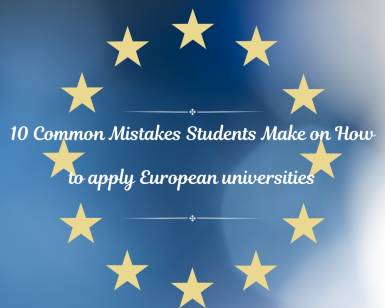10 Common Mistakes Students Make on How to apply European universities
 Posted date: 25 Apr 2025
Posted date: 25 Apr 2025
For many students, pursuing higher education in Europe is a lifelong goal — and rightly so. Europe presents an excellent standard of education, cultural richness, global exposure, and long-term career possibilities. However, many applicants unintentionally make mistakes that lead to delays or rejections during the admission process.
Below is a detailed breakdown of the ten most frequent errors — and practical tips to avoid while applying for university in Europe them:
1. Overlooking Application Timelines
Every European nation follows its own academic calendar and university deadlines. While some institutions close applications early, others have several intake rounds.
How to Avoid: Research each university’s application timeline separately. Create a tracker to note down all key dates — including those for applications, scholarships, and student visas.
2. Choosing Courses Without Examining Their Content
Selecting a study program based purely on its name can be misleading. A course with the same title may offer very different content depending on the university or country.
How to Avoid: Carefully review the curriculum. Pay attention to teaching methods, coursework, practical exposure, and future career opportunities.
3. Not Meeting Language Requirements
Even though many European degrees are delivered in English, some still have language-related conditions. A few programs may even need proof of proficiency in the local language.
How to Avoid: Confirm whether you’ll need to submit scores from language tests like IELTS or TOEFL. Some universities accept proof of prior English-medium education instead.
4. Using the Same SOP for All Applications
Sending the same Statement of Purpose to every institution reduces your chance of standing out. Universities look for students who show a genuine interest in their program.
How to Avoid: Personalize each SOP. Explain why you're choosing that specific university and how the course supports your academic and career path.
5. Providing Incomplete or Improper Documents
One of the top reasons applications get rejected is due to missing, incorrect, or unverified documents — such as untranslated records or lack of legal certification.
How to Avoid: Make a complete list of required documents. Have your transcripts translated by professionals and get necessary attestations or apostilles if requested.
6. Delaying the Visa Process
Many applicants begin working on their visa only after receiving an acceptance letter, which can create last-minute pressure.
How to Avoid: Begin preparing your visa documents early — like proof of finances, insurance, housing arrangements, and your valid passport — while waiting for admission confirmation.
7. Applying to Very Few Institutions
Only applying to one or two universities is risky. If those don’t work out, it could set back your plans by an entire academic year.
How to Avoid: Apply to several programs across different countries and academic tiers. Have a mix of target, match, and safe options.
8. Underestimating the Cost of Living
While tuition fees in Europe are often affordable, everyday expenses like rent, food, and transport can vary significantly across cities.
How to Avoid: Research the monthly cost of living in your target city. Consider total expenses — including accommodation, public transport, meals, and unexpected costs.
9. Not Looking into Financial Aid
A number of students fail to obtain scholarships or financial aid, often due to the belief that they are not qualified or because they do not explore all available options thoroughly.
How to Avoid: Explore all possible funding opportunities. Many universities and governments offer scholarships based on merit, need, or country of origin.
10. Depending Completely on Education Consultants
While consultants can be helpful, blindly relying on them can lead to misinformation or poor decisions based on outdated advice.
How to Avoid: Use consultants as guides, but do your own research. Visit university websites, attend online info sessions, and read the latest updates from official sources.
Applying to European universities takes thoughtful planning and a keen eye for detail. Avoiding these common pitfalls can significantly increase your chances of admission and smoothen your transition abroad.
Start early, stay organized, and take ownership of your application — your European education journey is just around the corner.
Posted By

GSP Admin




